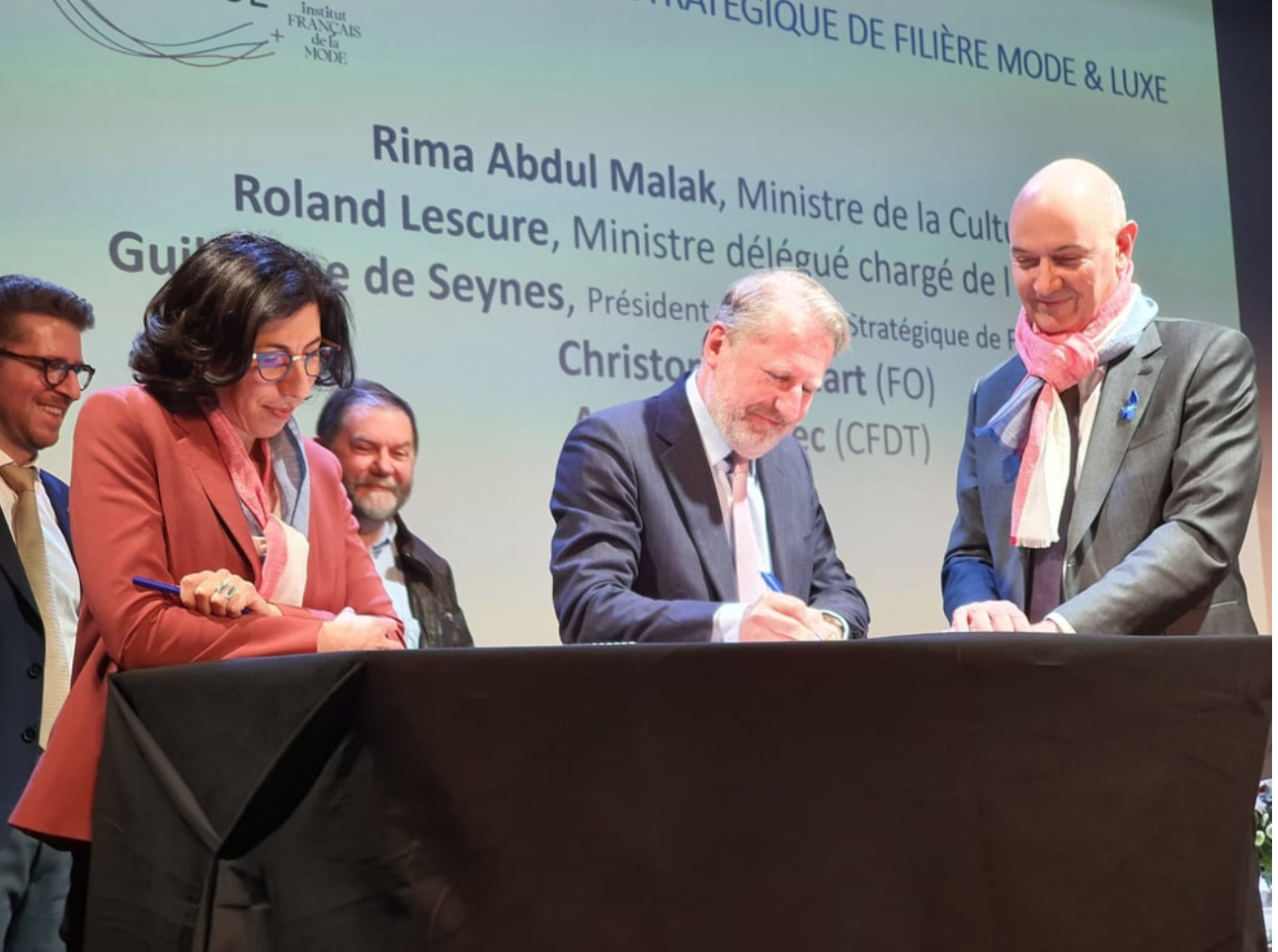
At the end of a very active day on the Made in France trade fair stands, all the federations and representatives of the sector (textiles, clothing, leather, linen, wool, etc.) converged on the Carreau du Temple (Paris IIIe) for the occasion. Wearing tricolour linen scarves donated by the president of the Union des Industries Textiles Olivier Ducatillion, owner of weaver Lemaire Demeestere, ministers Rima Abdul Malak (culture) and Roland Lescure (industry) praised the sector’s ability to unite around common projects.
“Few sectors in France are as organised as you are, with major players who ensure that smaller ones can emerge”, stressed the Minister Delegate for Industry, praising in particular the role of French luxury as an ambassador throughout the world, and calling for the collective pride of saying that we produce and consume French products to be accelerated. “In the field of cultural industries, they are all looking at you: books, music…” pointed out the Minister of Culture. “They see that beyond speeches, charters and working groups, concrete actions can be launched.
Guillaume de Seynes, president of the CSF Mode et Luxe and director of the Hermès group, agrees with this point. “I am not inclined towards grand speeches, but towards concrete and pragmatic actions”.
For the CSF, which brings together federations of brands and manufacturers, public authorities and trade unions, this signing comes a little over four years after the first strategic contract, which was signed at a French Fashion Institute attended by the ministers Bruno le Maire (economy) and Franck Riester (culture). A rider was then signed in April 2021, setting out thirteen approaches linked to training, support for companies, aid for relocation, traceability and sustainable fashion.
“This new contract is not a revolution, but the continuation of the previous contract in its ambitions and objectives, and above all its collective effort”, explains Frédérique Gérardin, general delegate of the CSF Mode et Luxe, to FashionNetwork. “This contract brings above all a new impetus, with new ministers involved and new personalities who have emerged from the industry. It was therefore necessary to put things back on track, to confirm the budgets and to renew everyone’s commitment. Because we are faced with challenges that are long term.
Training and attractiveness of technical professions
The document, which is about thirty pages long, focuses on training. This is an area in which three distinct objectives are formulated, for projects financed via the OPCO 2i, the skills operator for industrial sectors.
The first of these objectives is to promote the attractiveness of technical professions. The sector has been complaining for years about the difficulty of finding new recruits, whether qualified or not, to the point of jeopardising the acceleration that the French textile sector has been experiencing for the last 10 years. A challenge, therefore, which the new contract faces with the campaign “With industry, we have a future to make” launched by the OPCO 2i, budgeted at around 250,000 euros.
Another objective is the safeguarding, transmission and perpetuation of know-how. This is a point on which the sector contract is banking, in particular, on the experimentation of a “fixed-price course” approach to better deal with the retirement of those with know-how. But the sector also aims to develop new courses that take into account issues such as digital technology or sustainable development, via training plans within the sector and between sectors. All this for a budget of 300,000 euros fixed until next June.
“We need to talk about our professions and adapt the training mechanisms to make them relevant to the changing needs of companies.
Accelerators and aid for relocation
A second axis of the contract concerns the support of companies with Bpifrance. A project that includes the continued development of dedicated accelerators, with a specific support offer for brands and subcontractors. A project budgeted at 726,000 euros and which will be financed by Bpifrance and by the CPDE (professional committees of economic development). These are organisations that the industry is familiar with through Defi (fashion), the Technical Centre for Leather (CTC) and Francéclat (jewellery and watchmaking). The CPDE and the federations will share the orders for the accelerator projects.
Another aspect: the deployment of a “Made in France Objective” aid scheme for relocation. This scheme should be financed to the tune of 325,000 euros by Bpifrance, be placed under the governance of Defi, and benefit the Maison du savoir-faire et de la création (House of know-how and creation), an offshoot of the UFIMH (Union of fashion and clothing industries).
Decarbonation, traceability, labelling…
Sustainability is the third major axis of this new sector contract. Starting with decarbonation, via support led by the Union of Textile Industries (UIT) and the CPDE, and financed to the tune of 35,000 euros in part by the Ademe (Agency for the Environment and Energy Management).
Two objectives have been set for traceability. The first is the dissemination of the lessons learned from the pilot projects, carried out in 2022 and 2023 under the direction of the sector’s CSR Traceability Steering Committee, a summary of which will be available in January 2024. Support for the integration of traceability methods is also planned for 2023-2027. Two objectives financed by the CPDE.
Display, a major issue in 2023, has not been forgotten. The CSF wishes to compare the methods and databases used on an anonymised and representative sample of textile products. The aim is to ensure that the eco-design approaches claimed are “relevant, objective, transparent, scalable, SME compatible and compatible with European regulations”. The scheme will mobilise 110,000 euros from the Ademe, the CPDEs and the CTIs (industrial technical centres).
Another objective is to establish a follow-up of the CSR regulations that are being developed. This task will be placed under the direction of Eric Boël for the ITU and Frank Boehly for the CNC (National Leather Council). In addition, under the direction of the eco-organisation ReFashion, there is a methodology project for calculating the recyclability of products.
Read more in Fashion Network
